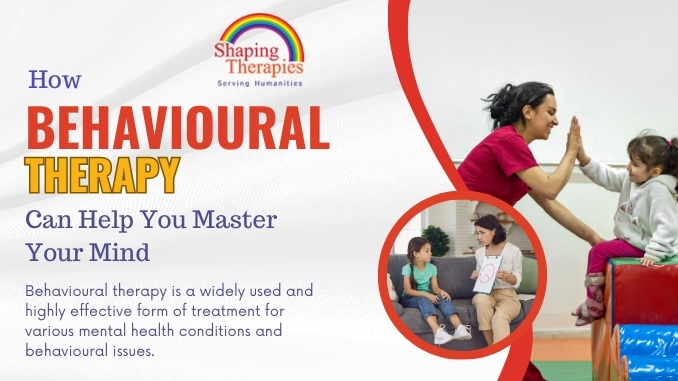
Feeling overwhelmed by stress, anxiety or negative thought patterns? You’re not alone. Millions of people struggle with these challenges, and traditional advice like “just relax” often falls flat. But what if there was a way to actually reprogram your brain and develop healthier coping mechanisms? Behavioural therapy, a powerful tool that can help you ditch the drama and take control of your mental well-being.
Behavioural therapy is a widely used and highly effective form of treatment for various mental health conditions and behavioural issues. Rooted in the principles of behaviourism, it focuses on identifying and modifying harmful behaviours, thoughts, and emotions. Whether you’re dealing with anxiety, depression, or simply want to improve certain aspects of your life, behavioural therapy can offer valuable tools and techniques. Let’s dive into what behavioural therapy is, how it works, and its many benefits.
What is Behavioural Therapy (BT)?
Think of BT as your personal brain gym. It’s a form of therapy that focuses on identifying and changing unhelpful thought patterns and behaviours. By working with a qualified therapist, you’ll learn practical strategies to manage stress, anxiety, and other mental health concerns.
Behavioural therapy is a type of psychotherapy that aims to change negative behaviours and thought patterns. Unlike other forms of therapy that delve into a person’s past, behavioural therapy is primarily concerned with the present and focuses on current problems and solutions. It is based on the belief that behaviors are learned and can be unlearned or modified through various therapeutic techniques.
Techniques Used in Behavioural Therapy
- Cognitive Behavioural Therapy (CBT): One of the most popular forms of behavioural therapy, CBT combines cognitive and behavioural techniques to address negative thought patterns and behaviours. It helps individuals identify and challenge distorted thinking and develop healthier ways of coping.
- Exposure Therapy: Commonly used for anxiety disorders and phobias, exposure therapy involves gradually exposing individuals to feared situations or objects in a controlled manner. This helps reduce anxiety and build tolerance.
- Systematic Desensitization: This technique is used to treat phobias and anxiety disorders by gradually exposing individuals to anxiety-provoking stimuli while teaching relaxation techniques to counteract the anxiety response.
- Operant Conditioning: Based on the principles of reinforcement and punishment, operant conditioning aims to increase desirable behaviors and decrease undesirable ones. Positive reinforcement involves rewarding desired behaviors, while negative reinforcement involves removing aversive stimuli.
- Behavioural Activation: Often used to treat depression, behavioral activation focuses on increasing engagement in enjoyable and meaningful activities. By scheduling and participating in positive activities, individuals can improve their mood and overall well-being.
Who can benefit from Behavioural Therapy?
BT is a versatile tool that can be used to address a variety of challenges, including:
- Anxiety disorders: Learn to manage worry and fear through techniques like exposure therapy and cognitive restructuring.
- Depression: Develop strategies to combat negative thoughts and improve mood.
- Obsessive-compulsive disorder (OCD): Gain control over intrusive thoughts and repetitive behaviors.
- Anger management: Learn healthier ways to express and manage anger.
- Phobias: Overcome specific fears and anxieties.
- ADHD: Developing strategies for focus, attention, and managing impulsivity.
- Autism Spectrum Disorder (ASD): Improving social communication skills and reducing repetitive behaviors.
Behavioural Therapy for Children
- Behavioural therapy for children teaches them healthier ways to respond to situations.
- Therapists use positive reinforcement to reward good behavior and discourage negative habits.
- Building trust is key, and it may take time for a child to feel comfortable.
- This therapy can benefit children with ADHD, Autism Spectrum Disorder (ASD), and anxiety.
- Success often requires parents, teachers, and caregivers to work together consistently.
Benefits of Behavioural Therapy
- Effective Treatment: Behavioural therapy has been proven effective in treating a wide range of mental health conditions, including anxiety, depression, obsessive-compulsive disorder (OCD), post-traumatic stress disorder (PTSD), and eating disorders.
- Practical and Actionable: With its focus on the present and practical problem-solving, behavioral therapy provides individuals with actionable strategies they can implement in their daily lives.
- Empowerment: By learning to identify and change negative behaviors and thought patterns, individuals gain a sense of control over their lives and mental health.
- Improved Relationships: Behavioural therapy can help individuals develop better communication and interpersonal skills, leading to healthier and more fulfilling relationships.
- Long-lasting Results: The skills and techniques learned in behavioural therapy can have long-lasting effects, providing individuals with tools to manage future challenges effectively.
How Does Behavioural Therapy Work?
- Positive Reinforcement: Rewarding your child for good behavior helps them understand and repeat those positive choices.
- Replacing Negative Habits: Therapists identify and gently discourage unhelpful behaviors, teaching new skills in their place.
- Building Trust: Creating a safe and supportive environment is key. It may take time for your child to feel comfortable opening up.
Ready to See Positive Changes?
Does your child face challenges with emotions, focus, or social interaction? Shaping Therapies Centre in Thane and Powai offers effective behavioural therapy programs. Our therapists create a safe and nurturing environment to equip your child with the skills they need to thrive.
Consider reaching out to the Shaping Therapies Centre in Thane and Powai to learn more about behavioural therapy. With time, patience, and a supportive network, your child can develop the skills and confidence they need to thrive.
Behavioural therapy is a powerful tool for positive change, offering practical and effective solutions for a wide range of mental health issues and behavioral challenges. By focusing on the present, setting measurable goals, and utilizing proven techniques, individuals can achieve lasting improvements in their mental health and overall quality of life. If you’re considering therapy, behavioural therapy at Shaping Therapies Centre in Thane and Powai might be the right path to help you navigate life’s challenges and achieve your goals.

Leave a Reply